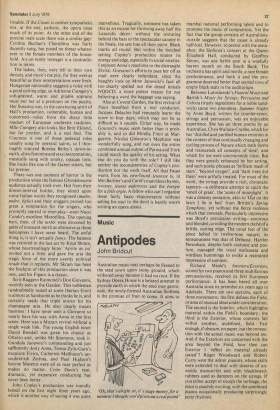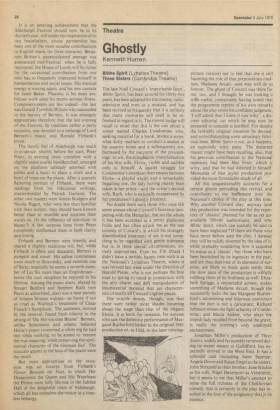Music
Antipodes
John Bridcut
Australian music may perhaps be likened to the seed sown upon stony ground, which withered away because it had no root. If the Sydney Opera House is a belated attempt to provide earth in which the seed may germinate, the newly-formed Australian Sinfonia is the promise of fruit to come. It aims to marshal national performing talent and to promote the music of compatriots. Yet the fact that the group consists of Australiansin-exile suggests that the cause is already half-lost. However, to persist with the metaphor, the Sinfonia's concert at the Queen Elizabeth Hall, conducted by Geoffrey Simon, was one fertile spot in a woefully barren month on the South Bank. The orchestra has spirit and mettle, a rare female predominance, and both it and the programme deserved better than serried rows of empty black seats in the auditorium.
Between Lutoslawski's Funeral Music and Bartok's Music for Strings, Percussion and Celesta (trusty ingredients for a noble sandwich) came two premieres. Summer Nights by Anne Boyd, written for counter-tenor, strings and percussion, was an enjoyable experience. She has set three poems by an Australian, Chris Wallace-Crabbe, which for her 'distilled and purified human emotion in the context of that continually changing and cycling process of Nature which both forms and transcends all concepts of time', and which for me were uncommonly crass. But they were greatly enhanced by her setting, and such poetic phrases as 'brilliant mash of stars', 'beyond oxygen', and 'dark trees dot them' were artfully treated. For most of the work, the strings provide a rich, chromatic tapestry—a deliberate attempt to catch the 'smell of grass', the 'acres of moonlight'. It was a dreamy sensation, akin to 'Ott on the lawn I lie in bed' from Britten's Spring Symphony, yet without the fierce violence which that conceals. Particularly impressive was Boyd's percussion writing--sonorous and blended, avoiding the modern cliché of a brittle, cutting edge. The tonal feel of the piece belied its twelve-tone nature; its sensuousness was that of Debussy. Hartley Newnham, despite both costume and posture, managed the vocal melismata and wordless hummings to evoke a restrained impression of summer.
Richard Meale's Interiors' Exteriors, scored for two pianos and three multifarious percussionists, received its first European performance: it has been heard all over Australia since its premiere six years ago in Adelaide. There are two sections, each of three movements: the first defines the Field, or area of musical ideas under consideration. The second is the Interior, which highlights material within the Field's boundary; the third is the Exterior, whose contents fall within another, undefined, field. • Fair enough, if obscure, on paper, but the connection with the actual music was beyond me. And if the Exteriors are concerned with the area beyond the Field, how then can Exterior I 'reflect on material already stated'? Roger Woodward and Robert Curry were the adroit pianists, whose skills were extended to deal with sheaves of unwieldy manuscript and with blackboardrubbers used as dampers on the strings. If you either accept or except the verbiage, the piece is patchily exciting, with the combined pianos occasionally producing surprisingly jazzy rhythms.
It is an amazing achievement that the Aldeburgh Festival should now be in its thirtieth year, still under the inspiration of its two brainfathers, whose partnership has been one of the most notable contributions to English music for three centuries. Benjamin Britten's unprecedented peerage was announced mid-Festival: when he is fully recovered, the House of Lords will be richer for the occasional contribution from one who has so frequently interested himself in humanitarian and social issues. His musical energy is waxing again, and his new cantata for Janet Baker, Phaedra, is his most ambitious work since his recent serious illness. Composers-peers are few indeed—the last was Gerald Tyrwhitt-Wilson who succeeded to the barony of Berners. It was strangely appropriate therefore that the last evening of the Festival, by tradition rather a party occasion, was devoted to a melange of Lord Berners's music and Ronald Firbank's prose.
The family feel of Aldeburgh was much in evidence: shortly before the start, Peter Pears, in evening dress complete with a slightly outré scarlet handkerchief, emerged on the platform (already adorned with palms and a bust) to place a cloth and a bowl of roses on the piano. After a scarcely flattering portrait of Firbank, there were readings from his ridiculous writings, masterminded by Patrick Garland. The other two readers were Anton Rodgers and Nicola Pagett, who were less than familiar with their scripts; they should have known better than to mumble and mistime their words so. (Is the influence of television to blame?) A few surprise lines from Pears completely outflanked them in both clarity and timing.
Firbank and Berners were friends, and shared a slightly malicious wit, but, while Firbank is effete and decadent, Berners is pungent and novel. His saline conciseness owes much to Stravinsky, and reminds one of Satie; musically he seems a seventh member of Les Six more than an Englishman— hence the cool reception he enjoyed in his lifetime. Among the piano duets, played by Steuart Bedford and Stephen Ralls (not Pears as advertised, alas) was a neat parody of Johann Strauss waltzes—as funny if not as cruel as Warlock's treatment of Cesar Franck's Symphony. The audience, revived by the interval, found fresh hilarity in the setting of 'Du bist wie eine Blume': Berners, unlike Schumann and others, believed Heine's poem concerned a white pig he had met while walking, so he aimed to 'restore the true meaning, while preserving the sentimental character of the German lied'. The staccato grunts in the bass of the piano were the result.
But most appropriate to the occasion was an excerpt from Firbank's Flower Beneath the Foot, in which Her Dreaminess the Queen and His Weariness the Prince were fully life-size in the Jubilee Hall of the delightful town of Aldeburgh, which all but embalms the visitor in a timeless lethargy.



































 Previous page
Previous page